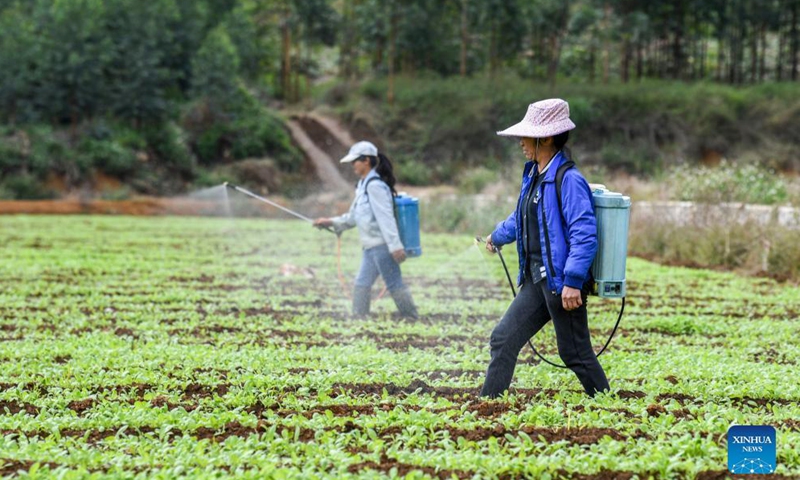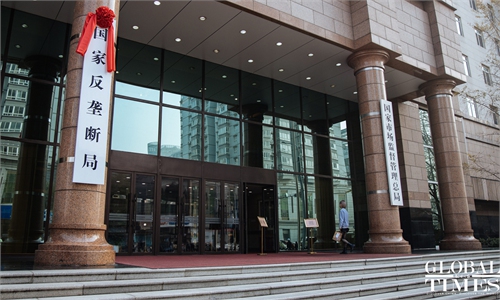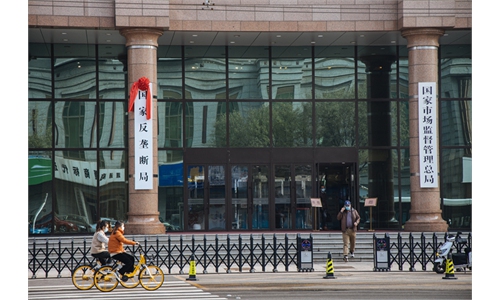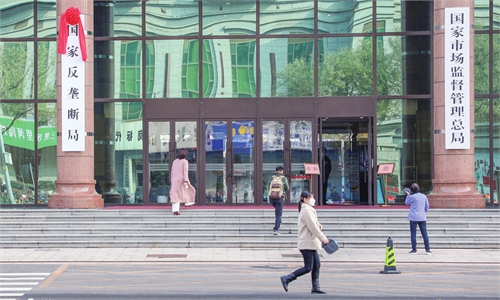China produces urea in full swing for fertilizer use, emissions reductions amid global shortage: industry practitioners

Farmers apply fertilizer in the fields during the winter planting season at Darong Village of Wuxuan County, south China's Guangxi Zhuang Autonomous Region, Nov. 23, 2021.Photo:Xinhua
China is boosting production of urea, a raw material for and a necessity for vehicle emissions reductions, amid a global shortage, but exports to countries like Australia, which is facing a severe shortage, could be limited due to tightening domestic supplies as well as surging transport costs, industry practitioners and insiders told the Global Times on Sunday.Urea is widely used as nitrogen fertilizer in the agriculture industry, and it is the raw material for a wide range of chemical products such as AdBlue, or diesel exhaust fluid, which is used to reduce the nitrous oxide emissions of diesel engines under international standards.
"There is a serious shortage of urea in Australia. So far this month, we have exported more than 10 40-foot containers of urea to Australia," a manager surnamed Li at an AdBlue producer based in South China's Guangdong Province, told the Global Times.
The company mainly exported AdBlue to South Korea in October and November.
"At present, exports of urea are normal. There is no circumstance under which urea cannot be exported to Australia. The customs inspection period is about 15 days," said Li.
The General Administration of Customs announced that from October 15, "condition B" inspections - for exports that can be cleared only after an inspection and quarantine report issued by the destination country is obtained - would be required for 29 kinds of fertilizers and related materials, including urea.
"Since there are many exporters who do not have export commodity inspection qualifications, it will be very troublesome to export urea," Li noted.
Yu Lei, an industry observer, said that the tightening of export rules came after China's urea production fell, while exports increased, so domestic prices remained high.
Industry data showed that urea production in China from January to November decreased by more than 1 million tons year-on-year. But in the same period, China's exports of urea increased 400,000 tons to 5.26 million tons, customs data showed.
"The output decline was mainly due to environmental protection measures and carbon emission controls, and coal shortages in the second half of the year," Yu told the Global Times on Sunday.
Coal and natural gas are important feedstock for nitrogen fertilizer, and electricity is crucial to production. Global energy shortages have spread downstream on industry chains, according to industry insiders.
"Russia and Egypt have both imposed export quotas on fertilizers and restricted exports. In the EU, urea production stopped because of natural gas supply problems. The global fertilizer sector is indeed in a mess," said Yu.
In China, the National Development and Reform Commission, the top economic planner, announced on December 1 that a coordinating group of several ministries will be established to guarantee chemical fertilizer production, and on December 3 it announced supply guarantees for electricity, coal and natural gas for urea production.
"China is making a big push into fertilizer production, and is racing to contribute to global supplies of nitrogen fertilizer. The increased urea production is the short-term solution to the global urea shortage," said Yu.
But industry insiders doubted if Australia could ask for help from China, after South Korea negotiated with China to speed up urea clearance.
They added that Australia is short of urea, mostly for fertilizer use, while vehicle use is only a small part.
Li also noted that shipping costs from China to Australia are expected to increase further, driven by demand for urea and other products and the impact of the overseas pandemic.
"Sea freight from China to Australia increased by four times this week compared with November. At present, the free on board (FOB) rate from Guangdong to Australia is about 3,400 yuan ($533) per ton, and there is room for an increase, because the FOB price to South Korea was above 4,000 yuan at the beginning of November," Li said.



